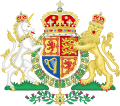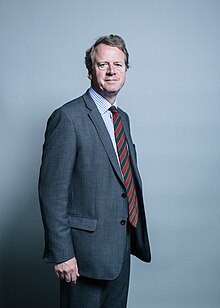Secretary of State for Scotland
| Her Majesty's Principal Secretary of State for Scotland | |
|---|---|
 Royal Arms as used by Her Majesty's Government in Scotland | |
since 24 July 2019 | |
| Scotland Office | |
| Style | The Right Honourable |
| Appointer | Elizabeth II |
| Inaugural holder | The Earl of Mar |
| Formation | 1926 (current form) 1 May 1707 (original form) |
| Deputy | vacant as Parliamentary Under-Secretary of State |
| Website | Scotland Office |
| This article is part of a series within the Politics of the United Kingdom on the |
| Politics of Scotland |
|---|
 |
The Secretary of State for Scotland (Template:Lang-gd, Template:Lang-sco), also referred to as the Scottish Secretary, is the principal minister of Her Majesty's Government in the United Kingdom of Great Britain and Northern Ireland representing Scotland. They head the Scotland Office (formerly the Scottish Office), a government department based in London and Edinburgh.
Post history
Prior to devolution (before 1999)
The post was first created after the Acts of Union 1707 created the Kingdom of Great Britain from the Kingdom of England and the Kingdom of Scotland. It was abolished in 1746, following the Jacobite rising of 1745. Scottish affairs thereafter were managed by the Lord Advocate until 1827, when responsibility passed to the Home Office. In 1885 the post of Secretary for Scotland was re-created, with the incumbent usually a member of the Cabinet. In 1926 this post was upgraded to a full Secretary of State appointment.
After devolution (since 1999)
After the 1999 Scottish devolution, the powers of the Scottish Office were divided, with most transferred to the Scottish Government or to other British government departments, leaving only a limited role for the Scotland Office. From June 2003 and October 2008, the holder of the office of Secretary of State for Scotland from 13 June 2003 through to 3 October 2008 also held another Cabinet post concurrently, leading to claims that the Scottish role was seen as a part-time ministry.
The current Secretary of State for Scotland is Alister Jack, who was appointed by Boris Johnson, replacing David Mundell.
Responsibilities
With the advent of legislative devolution for Scotland in 1999, the role of Secretary of State for Scotland was diminished. Most of the functions vested in the office since administrative devolution in the 19th century were transferred to the newly-established Scottish Ministers upon the opening of the Scottish Parliament, or to other UK government ministers. However the Secretary of State does represent Scotland in the Cabinet on matters that are not devolved to Holyrood and also holds Scotland Questions on the first Wednesday of every month between 11:30 am and 12 noon, when any Member of Parliament can ask a question on any matter relating to Scotland. However devolved issues are not usually raised by MPs. The Secretary is also the group leader of the Scottish MPs from the government party.
As a result of this, the office mainly acts as a go-between for the UK and Scottish Governments and Parliaments.[1] However, due to the Secretary's position as a minister in the British government, the convention of Cabinet collective responsibility applies, and as such the post is usually viewed as being a partisan one to promote the UK government's decision-making in Scotland, as adherence to the convention precludes doing anything else.
With the rise of the Scottish National Party in the Scottish and British parliaments and the resultant interest in Scottish Independence, the Secretary of State's role has also subsequently increased in prominence. The Scotland Office itself has received a cumulative increase in budget of 20% from 2013 to 2017, with a 14.4% increase in 2015/16 alone.[2]
The UK government's website lists the Secretary of State for Scotland's responsibilities as being:
"The main role of the Scottish Secretary is to promote and protect the devolution settlement. Other responsibilities include promoting partnership between the UK government and the Scottish government, and relations between the 2 Parliaments."[1]
This seeming lack of responsibility has in recent years seen calls from opposition MPs for the scrapping of the role and the Scotland Office.[3][2]
List of Scottish Secretaries
Secretaries of State for Scotland (1707–1746)
- John Erskine, Earl of Mar had served as Secretary of State of the independent Scotland from 1705. Following the Acts of Union 1707, he remained in office.
The post of Secretary of State for Scotland existed after the Union of the Parliament of Scotland and the Parliament of England in 1707 till the Jacobite rising of 1745. After the rising, responsibility for Scotland lay primarily with the office of the Home Secretary, usually exercised by the Lord Advocate.
| Portrait | Name (Birth–Death) |
Term of office | |
|---|---|---|---|

|
John Erskine Earl of Mar (1675–1732) |
(since 1705) 1 May 1707 |
3 February 1709 |

|
James Douglas 2nd Duke of Queensberry (1662–1711) |
3 February 1709 |
6 July 1711 |

|
John Erskine Earl of Mar (1675–1732) |
30 September 1713 |
24 September 1714 |

|
James Graham 1st Duke of Montrose (1682–1742) |
24 September 1714 |
August 1715 |

|
John Ker 1st Duke of Roxburghe (1680–1741) |
13 December 1716 |
August 1725 |

|
John Hay 4th Marquess of Tweeddale (1695–1762) |
16 February 1742 |
3 January 1746 |
Office thereafter vacant.
Secretaries for Scotland (1885–1926)
The Secretary for Scotland was chief minister in charge of the Scottish Office in the United Kingdom government. The Scotland Office was created in 1885 with the post of Secretary for Scotland.[4] From 1892 the Secretary for Scotland sat in cabinet. The post was upgraded to full Secretary of State rank as the Secretary of State for Scotland in 1926.[5]
From 1885 to 1999, Secretaries for Scotland and Secretaries of State for Scotland also ex officio held the post of Keeper of the Great Seal of Scotland.[6] From 1999, the position of Keeper of the Great Seal has been held by the First Minister of Scotland.[7]
Secretaries of State for Scotland (1926–present)
- Notes
- ^ Duke of Lennox in the peerage of Scotland
- ^ MP for Forfar until 1909; created Baron Pentland 1909
- ^ MP for Wick Burghs until 1918; MP for Roxburgh and Selkirk thereafter
- ^ a b Concurrently served as Secretary of State for Transport
- ^ MP for Edinburgh Central until 2005; MP for Edinburgh South West thereafter
- ^ Concurrently served as Secretary of State for Defence
See also
- First Minister of Scotland
- Secretary of State, a senior post in the pre-Union government of the Kingdom of Scotland
- Under-Secretary of State for Scotland, junior minister supporting the Secretary of State for Scotland
- Shadow Secretary of State for Scotland
- Secretary of State for Northern Ireland
- Secretary of State for Wales
References
- ^ a b "Secretary of State for Scotland - GOV.UK". www.gov.uk. Retrieved 16 January 2017.
- ^ a b "SNP questions budget of 'zombie department' Scotland Office". STV News. Retrieved 16 January 2017.
- ^ "BBC NEWS | UK | Scotland | Scrap Scotland Office, SNP urging". news.bbc.co.uk. Retrieved 16 January 2017.
- ^ Secretary for Scotland Act 1885, section 2.
- ^ Secretaries of State Act 1926
- ^ Secretary for Scotland Act 1885, section 2; Secretaries of State Act 1926, section 1
- ^ Scotland Act 1998, section 45(7)
- ^ "Mr John Gilmour". Hansard 1803–2005. UK Parliament. Retrieved 24 September 2017.
- ^ "Sir Archibald Sinclair". Hansard 1803–2005. UK Parliament. Retrieved 24 September 2017.
- ^ "Mr Godfrey Collins". Hansard 1803–2005. UK Parliament. Retrieved 24 September 2017.
- ^ "Mr Walter Elliot". Hansard 1803–2005. UK Parliament. Retrieved 24 September 2017.
- ^ "Mr John Colville". Hansard 1803–2005. UK Parliament. Retrieved 24 September 2017.
- ^ "Mr Ernest Brown". Hansard 1803–2005. UK Parliament. Retrieved 24 September 2017.
- ^ "Mr Thomas Johnston". Hansard 1803–2005. UK Parliament. Retrieved 24 September 2017.
- ^ "Mr Joseph Westwood". Hansard 1803–2005. UK Parliament. Retrieved 24 September 2017.
- ^ "Mr Arthur Woodburn". Hansard 1803–2005. UK Parliament. Retrieved 24 September 2017.
- ^ "Mr Hector McNeill". Hansard 1803–2005. UK Parliament. Retrieved 24 September 2017.
- ^ "Hon. John Maclay". Hansard 1803–2005. UK Parliament. Retrieved 24 September 2017.
- ^ "Mr Michael Noble". Hansard 1803–2005. UK Parliament. Retrieved 24 September 2017.
- ^ a b "Mr William Ross". Hansard 1803–2005. UK Parliament. Retrieved 24 September 2017.
- ^ "Rt Hon Sir George Younger". UK Parliament. Retrieved 23 September 2017.
- ^ "Rt Hon Bruce Millan". UK Parliament. Retrieved 23 September 2017.
- ^ "Rt Hon Sir Malcolm Rifkind QC". UK Parliament. Retrieved 23 September 2017.
- ^ "Lord Lang of Monkton". UK Parliament. Retrieved 23 September 2017.
- ^ "Lord Forsyth of Drumlean". UK Parliament. Retrieved 23 September 2017.
- ^ "Rt Hon Donald Dewar". UK Parliament. Retrieved 23 September 2017.
- ^ "Lord Reid of Cardowan". UK Parliament. Retrieved 23 September 2017.
- ^ "Baroness Liddell of Coatdyke". UK Parliament. Retrieved 23 September 2017.
- ^ "Lord Darling of Roulanish". UK Parliament. Retrieved 23 September 2017.
- ^ "Rt Hon Douglas Alexander". UK Parliament. Retrieved 23 September 2017.
- ^ "Lord Browne of Ladyton". UK Parliament. Retrieved 23 September 2017.
- ^ "Rt Hon Jim Murphy". UK Parliament. Retrieved 23 September 2017.
- ^ "Rt Hon Danny Alexander". UK Parliament. Retrieved 23 September 2017.
- ^ "Rt Hon Michael Moore". UK Parliament. Retrieved 23 September 2017.
- ^ "Rt Hon Alistair Carmichael MP". UK Parliament. Retrieved 23 September 2017.
- ^ "Rt Hon David Mundell MP". UK Parliament. Retrieved 23 September 2017.
- ^ "Mr Alistair Jack MP". UK Parliament. Retrieved 24 July 2019.
External links
- Use dmy dates from March 2012
- Lists of government ministers of Scotland
- Political office-holders in Scotland
- Ministerial offices in the United Kingdom
- Secretaries for Scotland
- Government ministers of the United Kingdom
- 1705 establishments in the British Empire
- Lists of government ministers of the United Kingdom









































